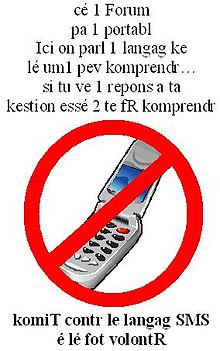The purpose of a language is to meet the communication needs of the society that uses it, so any living language is by its very nature bound to evolve as a result of social changes. Thanks to advances in technology, these developments sometimes progress quickly in certain demographic groups, particularly among teenagers, creating a significant chasm in the relationships between parents and teenagers.
One can often hear French parents bemoan their inability to comprehend conversation between their teenage children. It is not an insurmountable problem, but a decoder is needed to bridge the gulf. Here are some tips for French-speaking parents to reopen the channels of communication that have been obstructed by generational, technological and occasionally cultural factors.
SMS language (texting language)
SMS language came about as a way to reduce the length of words used and thus avoid exceeding the number of characters allowed by text messages, as well as to speed up typing on mobile phone keypads. These technological constraints gave rise to a form of communication that seems more intuitive to frequent users of SMS messaging and less familiar to parents, who do not recognise most of the codes, abbreviations and spellings used.

(Written in text speak) “This is a web forum, not a cell phone. if you want an answer to your query, try writing in a proper language”. Anti-SMS language poster itself written in SMS language. CC-BY-20
Here are some examples of SMS language decoded for the uninitiated by the Gralon forum:
- je vi1 2 = je viens de
– tu vas réu6r = tu vas réussir
– il tadi 2 / ke = il t’a dit de / que
– koi 2 9 = quoi de neuf ?
– 2m1 = demain
- je vi1 2 = je viens de (“I’ve just”)
- tu vas réu6r = tu vas réussir (“you can do it”)
– il tadi 2 / ke = il t’a dit de / que (“he told you that”)
– koi 2 9 = quoi de neuf ? (“what’s new?”)
– 2m1 = demain (“tomorrow”)
This utilitarian transformation of language is not to everyone’s taste. Désirée explains in her post what she finds most irritating when reading texts in SMS language:
Le langage sms, c'est bien pour les ados qui veulent se montrer rebelles, pour les gens qui ne veulent pas passer trop de temps à rédiger un sms et qui s'en fichent des fautes et ceux qui s'en fichent que leur correspondant pourrait ne pas comprendre leurs hiéroglyphes immondes. On l'aura compris, je suis contre ce langage préhistorique! J'avais moi-même testé quand j'étais ado et même dans ma période la plus rebelle, je n'ai pas pu me résoudre à envoyer des messages bourrés de fautes [..] LE problème c'est que la plupart des gens qui écrivent en langage sms ne font plus aucune différence entre mail et sms, ce qui n'est pas trop grave quand il s'agit de quelqu'un qu'ils connaissent mais qui devient un sérieux manque de respect quand il s'agit de quelqu'un qui leur est totalement inconnu.
Text speak is for teens who want to appear rebellious, for people who don’t want to spend too much time composing a text message and don’t care about errors, and people who don’t care that the person they’re writing to cannot understand their hideous hieroglyphics. As you might have guessed, I’m opposed to this prehistoric language! I tried it myself as a teen, and even in my most rebellious phase, I couldn’t bring myself to send messages full of errors […] The problem is that most people who write in text language make no distinction between emails and texts, which doesn’t matter too much when they’re writing to someone they know, but becomes seriously disrespectful when it’s to a total stranger.
Tizel is also opposed to the spread of this form of communication. He decries the increase in incomprehensibility of messages:
Le langage SMS est un vrai fléau. J'en veux pour preuve le nombre de forum devenus illisibles à cause de l'absence totale de modération sur ce plan. Mais ce fléau se retrouve également dans les blogs : la majorité des Skyblogs sont formulés en SMS; les commentaires déposés sur les blogs sont eux aussi, la plupart du temps, en SMS. Même certains mails que l'on m'envoie sont rédigés de la sorte. En plus, à force de rédiger de la sorte, je suis persuadé que ces personnes déforment leur orthographe.
SMS language is a real scourge. This is borne out by the number of forums that have become unreadable because of the total absence of moderation in this area. But this scourge is also found in blogs: the majority of Skyblogs are written in SMS; the comments posted on the blogs are mainly in SMS as well. Even some of the emails I receive are written the same way. I am also convinced that by writing this way these people are adversely affecting their spelling ability.
Some, however, see this evolution as an opportunity. Many novels for young people use text speak to convey a sense of realism. Others, such as Philippe Marso, have even written a whole novel in text speak.
Verlanised or anglicised language
Verlan is a form of French argot, in which the syllables of a word are inverted. When coupled with anglicisation of the vocabulary, it is sometimes difficult for parents to understand. Here is a glossary from Magic Maman of the words most commonly used by teenagers:
Accoucher : se dépêcher.
Arracher (s’) : partir.
Auch : verlan de chaud, cela signifie « c’est difficile ».
Balle (c’est de la) : c’est génial (une variante est possible avec « c’est chanmé !).
Boss : chef de bande ou patron.
Accoucher (literally: give birth): se dépêcher (to hurry).
Arracher (s’) (literally: tear oneself off): partir (to leave).
Auch (literally: hot but spelled in reverse): verlan de chaud, c’est difficile (It's difficult”).
Balle (c’est de la) (literally: it's the bee's knees): c’est génial or another variant is c’est chanmé! (“That's great!”).
Boss: chef de bande ou patron (boss).
But influences on the language don’t come just from English. Diversity in cities has impacted on the use of the French language amongst young people. Expressions from former colonies (mainly West and North Africa) have been naturally incorporated in this evolution. A project by a group of young people from Evry (Essonne) entitled Lexik des cités has been compiling a book of the expressions most used by young people from the cities. Here is an introduction to the project, which can be found on le Dino Bleu's blog:
“J’suis en pit », « Lui, c’est un 100 % roro », « J’ai invité mes sauces au barbecue », « Laisse tomber, il a toyé tout le monde ! », « Aujourd’hui je rince un grec », « Je suis yomb de toi »…Vous avez tout compris ? Non ? C‘est exactement pour cette raison qu’un groupe de jeunes originaires d’Evry a imaginé ce Lexik des cités illustré, bien différent des dictionnaires classiques. Pour que tous les durons (parents) autour d’eux puissent enfin comprendre leurs expressions et mieux les interpréter ! Voici la peinture d’une banlieue qui déchire, drôle et optimiste, où le langage est coloré et va du verlan à la métaphore, en passant aussi bien par l’arabe, l’africain, l’argot, le gitan que par… l’ancien français !
J’suis en pit (“I am in pit”), Lui, c’est un 100 % roro (“He is 100% roro“) J’ai invité mes sauces au barbecue (“I have invited all my dressings to the BBQ”), Laisse tomber, il a toyé tout le monde! (“Let it be, he just toyed with everyone”), Aujourd’hui je rince un greg (“Today, I will wash out my liquor”), Je suis yomb de toi (“I am yomb for you”)…Did you understand all that? No? That's exactly why a group of young people from Evry came up with the idea for this illustrated Lexik des cités, which is quite different from traditional dictionaries. So that all the parents could finally understand their expressions and interpret them better! It depicts the suburbs as vibrant, funny and optimistic, where language is colourful and goes from verlan to metaphor, drawing as much from Arabic, African, slang and gypsy as from old French.
Le Dino bleu adds:
C’est surtout l’intégration qui caractérise cet ouvrage. La juxtaposition de sensibilités, d’inspirations, de cultures, d’idées,… venues des quatre coins du monde et qui trouvèrent vite dans leur isolation forcée les conditions idéales pour se mélanger loin du conformisme ambiant si peu porteur d’inventions. Trop souvent présentés comme des zones de non-droits où ne règnent que la violence et les trafics en tous genre, en général par des médias en quête de ce sensationnalisme qui garantit une certaine audience, les cités développent en fait leur culture propre depuis un certain temps. Une identité forgée à partir de toutes ces civilisations d’Afrique, d’Asie, d’Europe de l’Est et d’ailleurs qui trouvèrent là un creuset où couler cet alliage dont on n’a pas encore pleinement mesuré la richesse.
Integration is the defining characteristic of this work. The juxtaposition of sensitivities, inspirations, cultures, ideas, etc. from all four corners of the world, which quickly found that their forced isolation gave them the ideal situation to mix together, a far cry from the prevailing conformity that does little to stimulate creativity. Too often, cities are presented as no-go areas riddled with violence and all kinds of trafficking, generally by the media looking for the kind of sensational headlines that guarantee a certain audience, but these cities have actually been creating their own culture for quite some time. An identity has been forged from all the civilisations of Africa, Asia, Eastern Europe and elsewhere, which found a melting pot there in which to cast this alloy, whose value hasn’t yet been fully appreciated.
The language of social networks or Internet slang
Another development that has arisen from advances in technology is digital language or Internet slang, which speeds up writing and punctuation, but can also let you know rapidly that a message has been read or understood. The main thing is to convey a message or idea to one’s correspondent in real time.
This language is constantly evolving owing to the growing impact of online culture on the general public. Websites such as Urban Dictionary or Know Your Meme are reference sites that provide a better understanding of web culture. The list of internet slang terms is growing rapidly, that’s for sure. Some terms have already passed into everyday written language, for example: FYI (for your information), JDCJDR (je dis cela, je dis rien – “just saying”) or BRB (be right back).
The Internet’s role in the evolution of languages is certainly a double-edged sword. On the one hand, it speeds up the disappearance of languages by standardising the means of communication. But it also plays a role in the preservation of endangered languages, by creating communities that ensure the conservation of languages in their traditional forms.
Despite the numerous objections to the misuse of language and syntax errors, it seems pointless to be hellbent on preventing a language from evolving in response to the developments of modern society. Ultimately, isn’t the most important thing to be able to create a relationship with other people, to pass on knowledge and ideas, and to understand each other?







